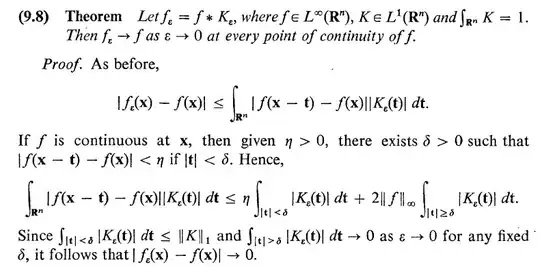For each $\epsilon > 0$, define $f_\epsilon:\mathbb R\to \mathbb R$ as follows: \begin{align} f_\epsilon(k) = \frac{1}{\pi}\frac{\epsilon}{\epsilon^2+k^2}. \end{align} How does one rigorously show (in the sense of distributions) that $f_\epsilon(k) \to \delta(k)$ as $\epsilon\to 0$?
I think I have the essential structure of an argument using contour integration, but it's missing some details that I don't have the expertise to fill in.
For each $a>0$, let $C_a$ be the CCW contour consisting of a straight segment between $-a$ and $a$ on the real axis, and a semicircular segment in the upper half plane of radius $a$. Then morally speaking, I'd hope the following steps are correct: \begin{align} \lim_{\epsilon\to 0}\int_{-\infty}^\infty f_\epsilon(k)\varphi(k)\, dk &= \lim_{\epsilon\to 0} \lim_{a\to\infty}\int_{C_a} \frac{1}{\pi}\frac{\epsilon}{(z-i\epsilon)(z+i\epsilon)}\varphi(z) \, dz \\ &= \lim_{\epsilon\to 0} (2\pi i) \frac{1}{\pi}\frac{\epsilon}{(i\epsilon + i\epsilon)}\varphi(i\epsilon) \\ &= \varphi(0) \end{align} However, I'm most concerned about the details of extending the test function $\varphi$ to a sufficiently nice function on $\mathbb C$ in order to perform the contour integration. In the book I'm studying, a test function is defined as a function in $C^\infty(\mathbb R)$ such that it and all its derivatives are $O(|x|^{-N})$ for all $N$ as $|x|\to\infty$.
Does any test function have a nice continuation to $\mathbb C$ that makes the above steps valid? Perhaps there is a way of doing this without contour integration so that one doesn't have to worry about continuation?
Edit. I was made aware by Mister Benjamin Dover below that there is in fact a quite general way to argue convergence to $\delta$ without complex analysis. I'm most interested at this point in determining if there is some way to make my manipulation above rigorous -- those sorts of arguments abound in the physics literature.
